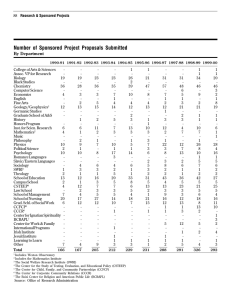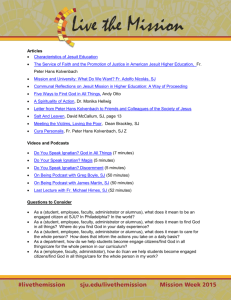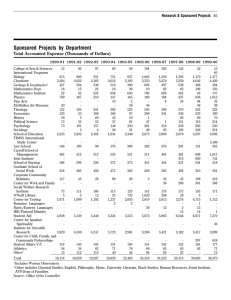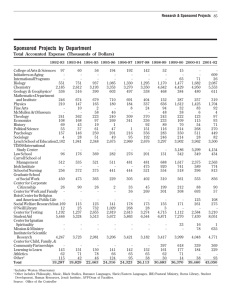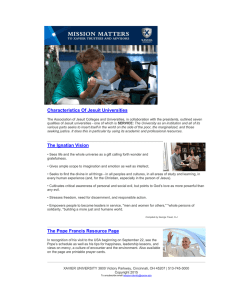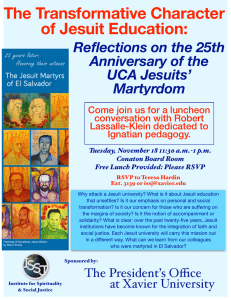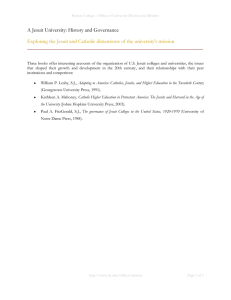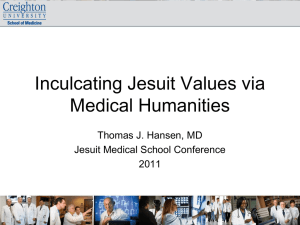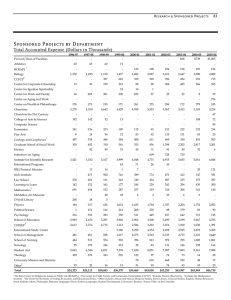I TITOLO Chris Lowney
advertisement
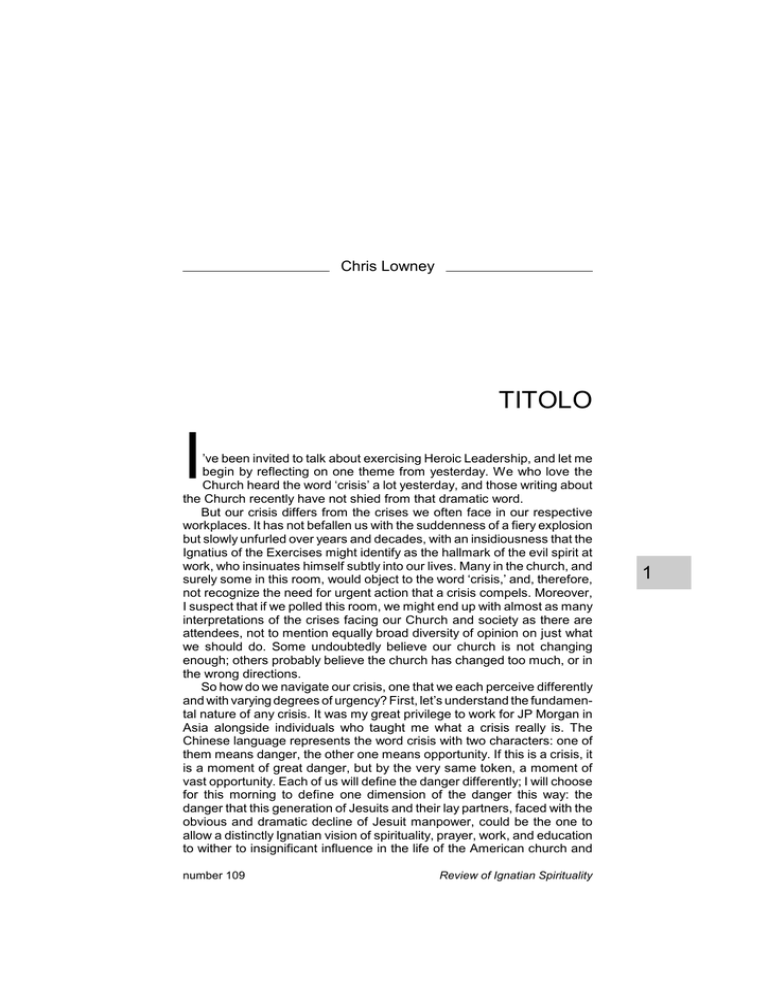
Chris Lowney TITOLO I ’ve been invited to talk about exercising Heroic Leadership, and let me begin by reflecting on one theme from yesterday. We who love the Church heard the word ‘crisis’ a lot yesterday, and those writing about the Church recently have not shied from that dramatic word. But our crisis differs from the crises we often face in our respective workplaces. It has not befallen us with the suddenness of a fiery explosion but slowly unfurled over years and decades, with an insidiousness that the Ignatius of the Exercises might identify as the hallmark of the evil spirit at work, who insinuates himself subtly into our lives. Many in the church, and surely some in this room, would object to the word ‘crisis,’ and, therefore, not recognize the need for urgent action that a crisis compels. Moreover, I suspect that if we polled this room, we might end up with almost as many interpretations of the crises facing our Church and society as there are attendees, not to mention equally broad diversity of opinion on just what we should do. Some undoubtedly believe our church is not changing enough; others probably believe the church has changed too much, or in the wrong directions. So how do we navigate our crisis, one that we each perceive differently and with varying degrees of urgency? First, let’s understand the fundamental nature of any crisis. It was my great privilege to work for JP Morgan in Asia alongside individuals who taught me what a crisis really is. The Chinese language represents the word crisis with two characters: one of them means danger, the other one means opportunity. If this is a crisis, it is a moment of great danger, but by the very same token, a moment of vast opportunity. Each of us will define the danger differently; I will choose for this morning to define one dimension of the danger this way: the danger that this generation of Jesuits and their lay partners, faced with the obvious and dramatic decline of Jesuit manpower, could be the one to allow a distinctly Ignatian vision of spirituality, prayer, work, and education to wither to insignificant influence in the life of the American church and number 109 Review of Ignatian Spirituality 1 2 TITOLO society just at a time when it’s most deeply needed. The great opportunity we all share is the converse: to conceive ways of applying and invigorating this Ignatian way of proceeding to fit the circumstances in which we and the church find ourselves, and thereby to address the challenges that you have all been discussing in small group sessions. Crises entail danger, and crises create opportunity: just think, for example, of initiatives conceived over the last two decades like the Jesuit Volunteer Corps, Ignatian Lay Volunteers, and the widespread lay leadership in so many traditional Jesuit ministries. Such initiatives were inconceivable in the church and Society of Jesus of the 1950s, precisely because no crisis convinced Jesuits of the need to pursue these S and other S exciting, fruitful initiatives that have since been undertaken. However we each might choose to describe our crisis, let’s please accept, each personally and together as a group, its scale. This generation of Jesuits and lay partners are called, privileged, and burdened to deal with challenge to their corporate existence and relevance matched only, as best I can tell, by the very first generation of Jesuits and those who lived immediately before and after the suppression. This is the team the Holy Spirit has chosen to put on the field at this critical moment; and if some of us are stubborn, stupid, and just too tired…more of you are kind, holy, smart, dedicated, just, and prayerful… indeed, some can even sing Irish drinking songs and recite Hopkins’ poetry. And let’s be encouraged that we today have in our shared Ignatian tradition unique and remarkable resources for coping with this moment, as the Chinese would say, of danger entwined with opportunity. Let me now turn to that question, first outlining five powerful foundational resources that we draw on, and then turning to outline some of the proactive ways of proceeding that I personally would consider characteristic of individuals and teams associated with Ignatius of Loyola’s vision. First, some of our resources: 1 . Invincible hope: Recall that core to the Christian tradition that animates every Jesuit apostolate represented here is this extraordinary scripture verse, “For she who was thought to be barren is now in her seventh month. For nothing is impossible with God.” Hope makes the Christian’s attitude toward crises and problems fundamentally different than the attitude of those who rely on human resources alone S how much more powerful when hope is shared by the full team engaging the problem at hand. That hope, of course, is but one dimension of a second enormous Review of Ignatian Spirituality xxxvi, ii / 2005 Chris Lowney 3 resource we all draw upon, namely; 2 . Shared faith in Christ Jesus, indeed, affiliation with a Society in His name: Even before considering the remarkable content of our faith, let’s not take for granted the incredible human power of any shared tradition. Faith bestows on this group a common language, common values, a common priority system: I can think of no multinational company engaged in as varied business lines as are represented in this room that could so easily find common explanation for being in those businesses, the values that need to motivate employees working within them, and so on. This shared faith, even in its human aspect, gives us an incredible leg-up over the great majority of human enterprises in attacking problems. Not even to mention, of course, the extraordinary content of that faith, and the shared opportunity for connection, consolation, and communion, not just with each other, of course, but with the Divine. Over these three days, attendees will pray together formally at least a half-dozen times; and just think of all the individual prayer of intercession, contemplation or discernment that will take place. No secular company on earth draws on that kind of unifying force; 3 . Everyone in this room inherits in some respect the legacy of what is probably the most incredible franchise in the history of organized religion. For over 400 years our predecessors have created a track record that has been to institutional religion what my JP Morgan was to investment banking, or, I say with hesitation here in the Maryland province, what the New York Yankees have been to baseball. I’m not aware that the Vatican has kept similar league tables of religious orders; but if they did, the Jesuits would surely boast an equally impressive record. Any marketers in the room know that strong franchises are mysteriously resilient: It’s hard to kill a good brand. Johnson and Johnson, Coke, and McDonalds have in our lifetimes easily survived blunders that would have doomed marginal players in their industries. We today can thank our predecessors for giving us margin for error: it should spur our willingness to experiment, knowing that no one mistake will doom the Ignatian project. There is still more beauty to the power of franchise: clients and customers, truth be told, tend to think you’re better than you actually are. We shouldn’t feel apologetic or embarrassed about that, but honor our predecessors by investing wisely the brand capital they’ve bequeathed us: the Ignatian or Jesuit label can help jump start and win credibility for initiatives that would be beyond the capacity of other religious orders to mount; 4. We have an incredible track record of surmounting crises against all number 109 Review of Ignatian Spirituality 4 TITOLO odds. The Jesuit company has throughout its long history grappled with crises that will make our current predicament seem like a normal day’s work. Imagine, for example, if we were sitting here in 1814, figuring out how to revive a company that hadn’t existed in 40 years. Or, those here from Georgetown, Scranton, or Wheeling who today summon help by emailing the Provincial or advertising in the Chronicle of Higher Education, might imagine how predecessors in the 1790s, working for a suppressed company, summoned help from Eastern European Jesuit colleagues with whom they had no working relationship and about whom they knew nothing. Jesuit predecessor generations have been suppressed globally, thrown out of more countries than you or I could count, in some cases multiple times; the founders were told by the pope that their global membership would not be permitted to exceed 60. In short, any true Ignatian team is good in a crisis. Why? That leads to the fifth and most practically relevant of the resources I want to enumerate; 5 . The spiritual exercises… Any company’s capacity to navigate crisis is intimately related to its corporate culture, the shared set of values, often unspoken, that govern the way individuals in an organization treat each other and approach the work environment. Corporate culture is a high falutin’, somewhat slippery term, and business school academicians sometimes express the idea more accessibly as “the way we do things around here.” Uncannily, the earliest Jesuits used almost exactly the same phrase, speaking regularly about their nuestro modo de proceder, or our way of proceeding. That way of proceeding draws on their Constitutions, their lived example, their letters to one another, but above all on the Spiritual Exercises, and surely every strength I’ve discussed so far is encapsulated and mediated through those Exercises: it’s a specific way in which Jesuits and their colleagues can experience and speak about faith and hope, and, important for our purposes, these Exercises can instill the personal disposition necessary for attacking problems proactively. So let me now move from the resources that we draw upon to the more proactive question of how characteristically an Ignatian-inspired team might demonstrate personal and corporate leadership in approaching opportunities and challenges. I’m going to elaborate loosely but successively on four workplace values that I choose to call heroism, ingenuity, love, and selfawareness. Given the roles you play and the tasks you all do, I hope you will hear each of these following four ideas as operative at three distinct levels: first, what does it mean personally for each of you as individuals to lead; second, many of you are managers or administrators in your professional lives: Review of Ignatian Spirituality xxxvi, ii / 2005 5 Chris Lowney what environment and capabilities do you want to forge among subordinates and across your college community; and finally, most important for us in the context of your meetings today and tomorrow: you are all in one way or another ‘trustees’ of the Society’s future, so I hope my comments might also spur your own thoughts and dreams about what kinds of leaders you want the Society to form for its future, and how you will participate in making that formation a reality. So How Do Ignatian-Style Leaders Operate? First, with courage, willingness to take risk, or as I put it in my book, heroically, and let me draw on an example from Jesuit history to illustrate how Jesuit heroism will differ from our stereotypical ideas of heroism. Since we’re gathered at a university, the case study of education might be particularly relevant. The Jesuits today operate what remains the most extensive private network of higher education in the world, with over 70 high schools and colleges in US alone. Maryland province schools occupy the foremost tier of that remarkable system, right behind Regis and Fordham in NY, where I studied. Within our lifetimes alone, this incredibly influential Jesuit education system across the world has educated presidents or prime ministers in US, Mexico, Canada, France, and God knows how many other countries. Jesuit alumni include so improbably diverse a trio as Bill Clinton, supreme court justice Antonin Scalia, and Fidel Castro. But the Jesuit education system was not always extensive or great, and while it was still in its shambolic infancy, an early Jesuit named Pedro Ribadeneira nonetheless had the utter temerity to write the king of Spain and describe that system as something so important that, “the well being of the whole world and all Christendom” depended on it. What a vision!….Yet, totally grounded in reality. For in another place, Ribadeneira offers this assessment of what it’s like to teach in a school: “It is a repulsive, annoying and burdensome thing to guide and teach and try to control a crowd of young people, who are naturally so frivolous, so restless, so talkative and so unwilling to work, that even their parents cannot keep them at home.” Ribadeneira is charting out a definition of heroism incredibly relevant for our modern workplaces: individuals who are completely grounded in reality S able to see all the problems, yet able to envision the richest possibilities inherent in the work they’re doing. Christians understand this as an incarnational sort of heroism; in other words, it imitates this Jesus who showed up in our messy, complicated world, yet somehow remained undeterred from his own ambitious vision of how human beings might live and treat one another. number 109 Review of Ignatian Spirituality 6 TITOLO This Jesuit Ribadeneira, in fact, may have articulated a wonderful model of heroism relevant not only to the teaching profession but in many of our work environments: this idea of immersing yourself squarely in the mucky reality you face each day, yet not losing sight of your guiding vision and fondest hopes. We’ve grown accustomed to associating heroism with extraordinary acts like saving persons trapped in burning buildings or saving comrades in battle. This Jesuit vision is instead proposing that heroism is less about the opportunity at hand S because most of us can’t control the opportunities that life will present us: we may never have the chance to save someone in distress S than it is about the response to the opportunity at hand, which we can always control. The teacher, social worker, or pastor has no guarantee that he or she will make a profound, life-altering impact in a child’s life: his or her heroism is manifest in the commitment to live and work as if he or she might make such a difference, never losing sight of the fullest vision of what might be accomplished. I’m reminded in this regard of an anecdote, I hope not apocryphal, that President Kennedy visited NASA in the early 60s, met a gentleman sweeping the floors, and to be polite asked him what his job was. He supposedly replied, “sir, I’m putting a man on the moon.” As leaders, we need likewise to get better at instilling in ourselves and among teams a mindset that no matter what one’s individual role, one can be participating in a broader vision by doing tasks not merely well, but in the spirit of trying to find ‘the magis,’ that opportunity to find what is ‘more’ in the work we do. The Ignatian corporate culture of this group invites you to be sure that each individual in your respective apostolates S starting with yourself S feels like a contributor to some broader project, something heroic, some lived incarnation of the magis. There’s another important lesson for us in this example. Some of us may from time to time consider teachers heroic, but most of us don’t consider such individuals leaders, at least as conventionally defined. This Jesuit model runs counter to a lot of our cultural stereotypes about what leadership is and who leads. Let me ask you to join me in a thought experiment for a few seconds by thinking of the names of two or three living persons you consider leaders… I wonder how many thought of your own name. I suspect virtually no one. Popular culture tells us that only those in charge are leaders S CEOs, generals, politicians; this early Jesuit vision is instead equipping everyone to lead in his or her own way by rolemodeling virtues like the heroism S or magis-that I just described, whether he or she is running a company, an individual contributor, a student, teaching, or raising children at home. This idea of leadership is not about status or hierarchical position on an organization chart, but about role modeling a certain way of living. Review of Ignatian Spirituality xxxvi, ii / 2005 Chris Lowney 7 This concept of leadership certainly may run counter to our cultural stereotypes, but such a definition is neither gimmickry, a fad, nor something I’ve made up. Consider one informal definition of being a leader that has great currency among academics working in the business arena S the Harvard Business School professor John Kotter, defines a leader as one who 1) sets out a vision of the future, 2) aligns others around that vision, and 3) helps them past the inevitable obstacles that stand in the way of attaining it. One of the dictionary definitions of leadership is quite similar, the act of pointing out a way, direction, or goal and influencing others toward it. Surely any Jesuit or lay colleague living out a value like ‘the magis’ is role modeling Kotter’s notion of leadership. As you all know better than I, Jesuit-style heroism S or magis S as expressed in the Exercises, comes with a clearly articulated objective: doing what is more for God’s glory, or for God’s greater glory. And this leads to a second set of challenges, and a second characteristic way of working, for individual leaders and teams today. What is more for God’s glory establishes a standard that transcends any individual here, and any one institution represented here. Bravo to the organizers of this conference that the deliberation sessions have been organized by geography and by apostolate, and never by individual institution. Incredibly, and unlike any for-profit corporation in the world, an Ignatian mindset, as I understand it from the Exercises, would call upon those of you from Georgetown S or Holy Trinity parish or Scranton Prep S to be free enough to walk away from those institutions if ‘God’s greater glory’ could be better served elsewhere. Don’t worry, no one is going to ask you to do so this week (at least that I’m aware of!). But the Jesuit spirit of indifference S of detachment, of freedom to do what is for God’s greater glory S is both a wonderful strength and a complicated challenge for an Ignatian team in the twenty-first century. Many lay partners, with families to support, don’t have the practical freedom to radically change their lives to pursue other opportunities. And let’s be frank, nor do all Jesuits in an age when Provincials may no longer have the practical authority to assign/insert Jesuits into educational institutions managed by independent boards of schools characterized by a tenure system. But I don’t see how these sometimes uncomfortable realities can absolve any group that calls itself Ignatian from the real detachment intended by the Spiritual Exercises. Magis that does not transcend the walls of a particular school or apostolate is not Ignatian-style magis. Ignatian-style leaders are free enough S call it ingenious enough, our second characteristic way of working S to keep thinking outside the box of a particular institution’s four walls. Early Jesuits quite consciously opened apostolates number 109 Review of Ignatian Spirituality 8 TITOLO in small urban clusters S schools, parishes, social centers S that inevitably leveraged each other; more striking still, early missioners in China and scholars in developed Europe leveraged each other by exchanging, for example, intelligence on astronomy and natural history. If legal concepts like separate incorporation and an increasingly secular world prevent you from figuring out ingenious ways to coordinate efforts, then to my mind at least, you’re failing the ingenious legacy of those who built this holy franchise we all inherit. Even within your respective institutions, a leader needs constantly to be thinking of fresh approaches to bringing the magis to life. The greatest Jesuit success story is arguably the move into education, and it’s instructive that this move involved a radical departure from their initial apostolic instincts. The greatest Jesuit failure, on the other hand, is arguably that eighteenth century Jesuits couldn’t out-maneuver the impending suppression of their company. I find it striking that a Jesuit historian living through that debacle diagnosed the catastrophe this way: “I believed that to handle misfortunes of an uncommon nature uncommon means should be employed...I was convinced that exceptional daring was essential.” The daring he spoke of was not in evidence, with the result that their company had to fold its tent. Now, “daring strategy” brings its own set of problems. My daring proposal for the future may strike you as utter lunacy, or threaten your job, or head us in a direction I consider wrong-headed for the Church. The reality that I work not alone but in teams can be stimulating but inevitably complicates the business of trying to be ingenious and daring in approaching work. Fortunately, the Ignatian tradition provides resources to ameliorate such complications. It’s surely no accident that when Ignatius crafted some 23 introductory observations to his program of Spiritual Exercises, the last two were set off with some prominence. The 22nd, the so-called presupposition, says this: “it is necessary to suppose that every good Christian is more ready to put a good interpretation on another’s statement than to condemn it as false….” This is a lesson for all of us here today, whether we think the Church and Society have changed too much or too little. That presupposition is not merely an intellectual statement but a broad way of looking at and treating others. It’s grounded in the Biblical vision, so prominent at the end of the Exercises, that each of us has been “created in God’s image,” is therefore uniquely dignified, worthy of respect S or, of love, thus the third characteristic way of working for an Ignatian team or individual. Accordingly, Ignatius in the Constitutions told Jesuit bosses to manage with “all the love and modesty and charity possible” so that teams could thrive in environments filled with “greater love than fear.” Those are Review of Ignatian Spirituality xxxvi, ii / 2005 Chris Lowney 9 the kinds of environments Ignatian leaders try to create, and that way of treating people is core to an Ignatian way of proceeding. Everyone knows that children learn and perform more productively when they are raised, taught, and mentored by families and teachers and coaches who value them as important and dignified, who set high standards, who create environments of love rather than fear. Why have we somehow convinced ourselves that our adult needs are so different? The best teams I was on at JPMorgan thrived precisely where there was trust, mutual support, real respect for each other’s talents, real interest in helping others succeed, and a willingness to hold each other accountable to high standards so that each of us might realize our fullest personal and team potential. The way we treat each other in corporate America and in much of American life is in many ways broken S highly politicized, sometimes Darwinian, occasionally fearful and suspicious. Many have pointed that out from pulpits, as pundits, or in classrooms, but they are telling us something that corporate America already knows. What would be new and extraordinarily powerful, at least to me, would be faculties, teams, and institutions that showed us in action different and effective ways of working, teams bound, for example, by the kind of love that I just spoke of. Could teams from Wheeling, Loyola, Scranton, Gonzaga, St. Aloysius, and St. Joe's pioneer radically different, love-based ways of “being faculty” or “being parish” and S importantly S demonstrate that they were more rather than less effective precisely on that account? I would note that the formal name the Jesuit founders chose for their company was, in their vernacular, Companìa de Jesus, company of Jesus. And the way they understood “company” is not what we would typically understand today. Although nowadays the meaning of the word company has been almost completely hijacked by commercial enterprise, recall that the Latin roots of the word are cum panis, to break bread together…in the 16th century “company” would more often refer to a religious group, a military troop, or even a group of friends. These early Jesuits clearly saw themselves as companions of Jesus and of each other, and that this companionship would energize their efforts. The Jesuit compania is offering you another challenge: to be sure your respective “companias” or apostolates manifest that root concept: groups characterized by mutual support that energizes team members. Doing so would not only fortify your respective teams and help them past the inevitable obstacles that come up, but might also give students, parishioners, and corporate America a potential alternative model of how to operate S what an incredibly powerful contribution that would be to American life in the 21st century. These three proactive leadership virtues I’ve discussed S risk-taking, number 109 Review of Ignatian Spirituality 10 TITOLO pursuing heroic ambitions, treating people with love S are hard, and Ignatian leaders fortunately have a fourth tool, one more habit, that helps. Self-awareness, primarily won through the Spiritual Exercises, is the foundation of all these leadership virtues. None of the dispositions I’ve spoken about is primarily a disengaged intellectual tool to be used, for example, in the way investment bankers become more effective by using present value calculations. Rather, Ignatian-inspired leaders become more effective at living the magis, detachment, being men for others, and so on, only through some personal conversion and commitment arising from lived experience of the exercises. These tools, if you will, call for real not notional assent to become truly powerful. The Harvard emeritus Abraham Zaleznik once observed that many conventional corporate leaders seem to be individuals who were ‘twice born,’ where some personal crisis like injury, alcoholism, or bankruptcy forced them to come to grips as adults with who they were and what they valued and wanted: if a crisis doesn’t thrust this moment of self-scrutiny upon us, we need to manufacture the process for ourselves, and the Exercises provide such a tool. In my opinion, it’s not enough for Ignatian school teams to merely plaster ideas like ‘magis’ on brochures or parrot them in class: those who do the plastering and parroting have to be deeply engaged and moved by these same ideas through the Exercises. These Exercises, in addition to motivating and grounding the other leadership virtues, also include a wonderful tool, via the examen, for staying on track. You all know that the examen encourages us each, three times a day if not habitually, to engage in short mental pit stops. In the morning, upon awaking, to remind ourselves of what we have to be grateful for and what we want to achieve. Then, twice more, once in the middle of the work day and once at its end, to again pause, remind ourselves of blessings, remind ourselves of goals, replay the previous few hours, and extract lessons learned. The Jesuits broke radically by abandoning the monastic practice of gathering together in chapel multiple times daily in order instead to pursue a much more activist lifestyle. Yet, Ignatius had the incredibly modern insight that we in the 21st century typically overlook: if you and I don’t have the luxury of retreating to chapel multiple times daily like monks, we need to find some other way of keeping ourselves focused and recollected as we bob along each day on a tide of e-mails, phone calls, and meetings without ever pulling back to take stock. I’m sure you’ve seen the fallout from this chaotic lifestyle as I have: the person who gets to the end of the day without ever getting to his or her # 1 priority, or the person who has a meeting go badly at 8:30 and remains distracted about it all day, draining Review of Ignatian Spirituality xxxvi, ii / 2005 Chris Lowney 11 productivity… for Ignatian style leaders, the examen also becomes the great regulator of other virtues, for example, am I being heroic or bold enough in my aspirations and goals; or, conversely, in my pursuit of new models, do I risk forsaking core values of either the Society or the Church. Put differently, am I balancing correctly the tension between core values and the imperative to adapt to the ever-changing world I work in… And just as Jesuit teams and institutions might role model more effective ways of working through environments of greater love and fear, so too might they distinguish themselves by showing the effectiveness of self-aware workplaces. Finally, though the premise of my book is that corporate America has a lot to learn from Ignatian wisdom, let me offer two ways in which we as individuals and teams might learn from corporate America. First is a sense of urgency. Anyone who works in a publicly traded company is painfully aware of being measured quarterly, when earnings reports emerge and stock prices swoon or soar. We all can lament the short-sightedness of that system, but let’s grant this much: it has a wonderful capacity to concentrate the mind on the task at hand. I don’t intend the word “urgency,” as so often used today, to mean a permanent state of anxious panic. Recall, after all, the famous maxim of St. Ignatius that we should “Work as if success depended on your own efforts, but trust as if all depended on God.” [I know that the interpretation of this maxim is debated, but since we’re not in the New England Province where Fr. Barrry lives, I hope you will humor me] The subconscious message of this maxim is incredibly important: our implicit assumption tends to be S if you get yourself into a specific job, you can make leadership impact; their implicit assumption is: you’re going to be making impact whatever job you’re in. Focus on the input you can control, not on what you can’t control. It pre-figures, I believe, so much modern psychological insight: for example, the principle that the healthiest individuals learn to “control the controllables”: highly proactive in the areas of life they can control, but free from obsession over what they cannot control. So, I would urge us to approach issues with the urgency that corporate America does so well, yet with Ignatian equanimity rooted in faith. The second lesson I would like to leave from corporate America is the importance of measuring results. Every corporate executive knows he or she will only get high quality results against objectives that are measured; what’s more, if you don’t measure, how do you know you’re succeeding? Prominently promoted as integral to the mission of virtually every Jesuit school I know is the concept of forming men and women for others. I’m sure that representatives of Jesuit schools here can cite with no difficulty number 109 Review of Ignatian Spirituality 12 TITOLO the SAT scores or graduation rates that indicate academic achievement at your respective institutions: can you also give me some statistic of how well you’ve done at turning those same students into men and women for others? With respect to alumni, to use the case of my own Jesuit high school, for example, we know that precisely 46.5% of the class of ‘76 gave money to Regis last year: we don’t have a clue what % of the class are currently living as ‘men for others.’ That it’s hard to measure a trait like this with any precision is no excuse for doing nothing. Ignatius, in a famous letter to missionaries going to Germany, cites lessons he claims to be taking from Satan: if Ignatius was willing to take best practices from Satan, than surely Ignatian-style leaders of the 21st century should not be shy to take best practices around urgency and measurement from corporate America. Let me sum up: 1 . We can be thankful, in an odd way, if we can each find in the Church today some crisis, some moment of danger entwined with opportunity, that will spur us to take the sort of initiative as individuals and in teams that we might otherwise be afraid to. 2 . Those gathered in this room should be thankful for the unique resources an Ignatian-grounded team brings to a crisis: Christian faith and hope, and an incredible Jesuit track record of success and of surmounting crises, thanks to the ‘corporate culture’ instilled through the Exercises. 3 . That specifically Ignatian corporate culture inspires response to challenge guided by four key characteristics: 1. it’s daring, heroic, and magis-driven; 2.detachment brings freedom and openness, the ability and willingness to change, think outside the box, to be, in a word, ingenious; 3. love binds teams, energizes teams, helps one to treat others with the respect they are due, and thereby helps a team work its way through differences of opinion; and, 4. self-awareness and the habit of the examen insure that action is bold enough, but that bold action never compromises core values and never wanders too far and too long from what the Spirit wishes. 4 . Just as Ignatius learned from Satan, we should be open to learn best practices whereever we can. From corporate America, we might learn to apply these gifts of the Exercises with an appropriate sense of urgency and to be fully accountable by measuring our progress against goals and objectives we consider important. Review of Ignatian Spirituality xxxvi, ii / 2005 Chris Lowney 13 5 . Finally, all these virtues, taken together, form a unique way of doing things, a unique way of proceeding. That way of proceeding looks a lot like what we in the modern world call leadership. Ignatian individuals and teams accept the privilege and challenge of leading themselves and the church, a leadership that they don’t conceive as conveyed by hierarchical status but by manifesting a set of core values in life and work. I leave you with one final observation, drawn from your founding generation, about the kind of people needed to help the Society meet the unprecedented challenges of the 21st century. When the ten Jesuit founders were getting their company started, even though they had no business plan and no very clear idea of the kind of work they would do, they did have a very clear idea of the kind of person they wanted to recruit to join them. Jeronimo Nadal believed the Society needed, quamplurimi et quam aptissimi, or in English, as many as possible of the very best. And the start of the Jesuit school system, as you know, was the result of no master plan to build a global higher education empire, but almost completely an accidental outgrowth of this recruiting vision as the Jesuit founders, distressed that European schools were not generating enough “aptissimi,” took measures to bring their own recruits up to standard. Though the focus of the Society’s school system soon changed dramatically toward educating laypersons, its core ambition never did: these were S and still are S places where the aptissimi S the very best S are to be molded. 21st century challenges are different, but to surmount them the Society still needs quamplurimi et quam aptissimi. Thank you for listening, and best of luck to all of us as we try to make ourselves, families, workplaces and this Province more self-aware, ingenious, heroic and loving. CHRIS LOWNEY is the author of Heroic Leadership: Best Practices from a 450Year-Old Company that Changed the World. The book is available through Amazon, in bookstores, or via www.chrislowney.com. Chris can be contacted directly at crlowney@netzero.net number 109 Review of Ignatian Spirituality
